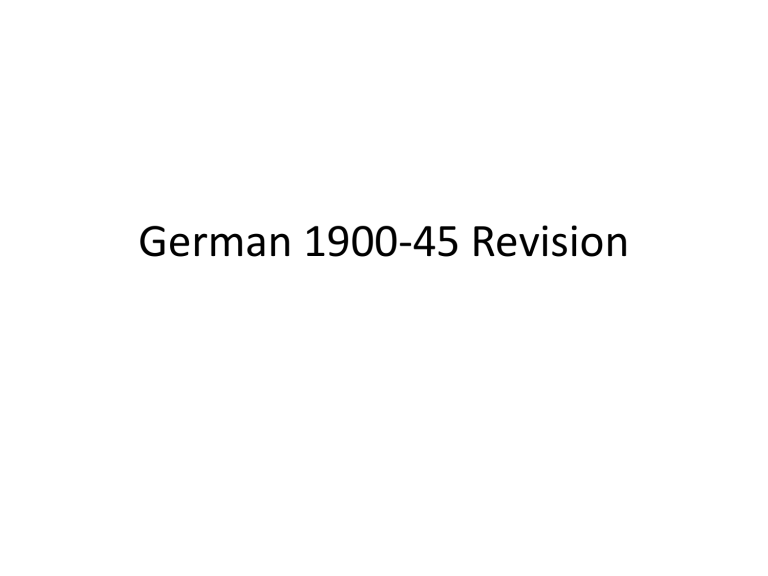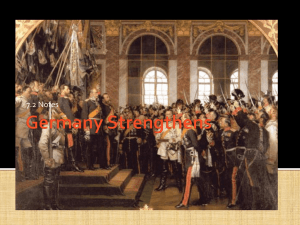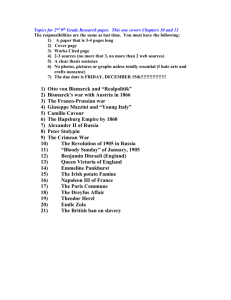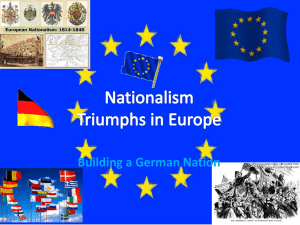File

German 1900-45 Revision
The moustache
Timeline (simple)
Weimar Republic
Restoration + Revolution
962
Holy Roman Empire
1814 1871 1918
German Empire
1930 1945
Third Reich
German Empire
• The state known as Germany was unified as a modern nation-state in 1871, when the German Empire was forged, with the Kingdom of Prussia as its largest constituent. After the French defeat in the Franco-Prussian War, the German
Empire was proclaimed in Versailles on 18 January 1871. The Hohenzollern dynasty of Prussia ruled the new empire, whose capital was Berlin. The empire was a unification of all the scattered parts of Germany except Austria (Kleindeutschland, or "Lesser Germany"). Beginning in 1884, Germany began establishing several colonies outside of Europe.
• In the Gründerzeit period following the unification of Germany, Emperor William
I's foreign policy secured Germany's position as a great nation by forging alliances, isolating France by diplomatic means, and avoiding war. Under William II, however,
Germany, like other European powers, took an imperialistic course leading to friction with neighbouring countries. Most alliances in which Germany had been previously involved were not renewed, and new alliances excluded the country.
Specifically, France established new relationships by signing the Entente Cordiale with the United Kingdom and securing ties with the Russian Empire. Aside from its contacts with Austria-Hungary, Germany became increasingly isolated.
The People
• The Presidency which was held by the King of Prussia (as German
Emperor). The German Emperor had considerable powers. He had personal control of the armed forces. He appointed and dismissed all
ministers including the Chancellor.
• The Federal Council (or Bundesrat) represented the different states of the
Empire. It had fifty-eight members. Seventeen were from Prussia, six from
Bavaria, four from Saxony. It had the power to change the constitution.
However no change could be made to the constitution if fourteen delegates objected. This in practice meant that Prussia could always stop change.
• The Parliament or Reichstag was elected by Universal Male Suffrage (all males over 25 could vote) and Secret Ballot. It voted on the Federal budget and its consent was needed for all legislation.
• This was the most advanced system in Europe at this time.
But….
• However, the powers of the Reichstag were limited:
• It could not initiate legislation.
• It had no say in the appointment or dismissal of the
Chancellor or Imperial ministers. The Imperial
Chancellor was appointed by the Emperor. He was in charge of foreign policy.
• The Kaiser (in effect Bismarck) could dissolve it any time with the agreement of the Bundesrat
Social changes
• Bismarck vowed to change the influence of the church.
• He did this by introducing
– Kulturkampf=culture war
• Now find out what Kulurkampf was
– http://www.historyhome.co.uk/europe/bisdom.ht
m
Railways (miles)
The Economy
1875
27,970
Coal (tons)
Iron (tons)
47,800,000
1,759,000
1900
46,500
142,650,000
7,550,000
And more
• Large sums of money were invested in technological development. Germany led the way in the sciences and her industry enthusiastically adopted the new scientific developments of the period
• Successful innovations included:
• The invention of the internal combustion engine (1876)
• Electric train (1879)
• Telephone network introduced into Berlin (1881)
• Four Wheel Cars were patented by Daimler and Benz
Population
• Germany's population also expanded rapidly, growing from 41 million in 1871 to 50 million in 1891. The rapidly industrializing economy changed the way this expanding population earned its livelihood. By the 1880s a majority of Germans were living in towns rather than in the countryside.
Society
• Bismarck and Socialism
• The creation of a large working class led to the growth of socialism. Bismarck saw the socialists as a threat to the social and political unity of the Reich
and to Europe. He accused them of being un-
German and greatly disliked the international nature of the movement. As Carr notes "Socialism like
Catholicism had allegiances beyond the Nation state which Bismarck could neither understand nor
tolerate".
Solution 1
• After a brief economic boom prompted by the euphoria of unification,a prolonged period of economic depression began in 1873.
• Bismarck decided to abandon free trade in favour of protection.
• This not only won him support from both industrialists and landowners but had the further advantage of making the imperial government’s finances less dependent on contributions from the states.
• Strong opposition from the Liberals, who supported free trade, led to a decisive break with them in 1879 when tariffs were introduced.
• Henceforth Bismarck relied on the Conservatives and the
Catholic Centre Party in the Reichstag.
Solution 2
• In 1878 Bismarck introduced anti-socialist laws
• In 1877 the SDP won half a million votes in the Reichstag election.
• Bismarck was alarmed and in 1878 introduced the anti-
Socialist laws which banned socialist organisations, meetings and newspapers.
• The socialists were not however, banned from membership of the Reichstag. Although it was handicapped, the Socialist
Party continued to grow in strength.
• The anti-Socialist law was renewed every three years until the fall of Bismarck but was then allowed to lapse.
The Kulurkampf (culture war)
• The North German Confederation was predominantly Protestant but southern
• Germany was Roman Catholic.
• When the German Empire was set up in 1871, it herefore had a substantial minority of Catholics. Bismarck feared that their loyalty to Rome would conflict with their loyalty to the Empire.
• The growth of ultramontanismin the Roman Catholic Church, highlighted by the proclamation of the doctrine ofPapal Infallibility in 1870, strengthened his suspicions. In the 1870s he conducted a struggle with the Catholics, known as the
Kulturkampf.
• By the May Laws of 1873–75 education was brought under state control and state approval was required for the censing of priests.
• The campaign backfired. Catholics rallied round and the Catholic Centre Party made gains in the Reichstag elections of 1877.
• Since Bismarck needed their support against the Liberals over tariffs, he toned down the Kulturkampf and withdrew some of the May Laws.
Wilhelm II
• William II succeeded as Kaiser at the age of 29. He was vain, neurotic and unpredictable.
• He was convinced of Germany’s world-historic mission.
• Despite his relationship with Queen Victoria, he was anti-British, although at the same time he admired Britain.
• William was an autocrat at the head of an autocratic system. Under the 1871
• constitution the Kaiser appointed the Chancellor and thus was in ultimate control.
• William I had allowed Bismarck to carry on the government with relatively little
• interference.
• William II was determined to use his powers personally and exercised a much more direct control over government than his grandfather.
• As he was also head of the army his personal power was very considerable.
• The significance of this quickly became apparent.
• William disagreed with Bismarck about the anti-Socialist policies, colonial expansion and relations with Russia. In
• 1890 Bismarck retired ‘because of his health’.
Germany
• A rising sense of nationalism was partly behind the building of Germany’s new navy
• There was even a Navy League pressure group with nearly a million members
• The sense of nationalism also spilled over into foreign policy
• They hoped that this would help overcome domestic opposition
• However this left Germany dangerously encircled by 1914 due to ill thought out expansionist policies
German Empire-confused?
• Some wanted to explore parts of Africa and Far
East, although some wanted to expand to the
Balkans, China and South America
• Others wanted to expand eastwards into Poland and Russia to create a huge trading bloc
• Above all was the Kaiser who wanted to oversee a German empire under his leadership
• Standing in his way was Britain already with an established empire and navy
Germany & Britain
• Despite his English visits the Kaiser was bitterly jealous of Britain and openly hostile towards it
• To achieve parity with Britains empire they believed they would first have to challange
British naval supremacy
• At the same time they believed that a strong
German navy would force the British into accommodation or diplomacy with Britain
The Naval Challange
• Admiral von Turpitz shared the Kaisers belief that
Germany should mount a naval challenge to
Britain through the creation of a battleship fleet
• It would also provide jobs and a market for the new steel works of Germany
• It would unify the country, embrace patriotism and nationalism, resolve social tensions and signify Germany’s bid to become a world power
Navy Laws
• 1898-It authorised the maintenance of a fleet of 19 battleships, 8 armoured cruisers, 12 large cruisers and 30 light cruisers to be constructed by 1 April 1904. Existing ships were counted in the total, but the bill provided for ships to be replaced every 25 years on an indefinite basis. Five million GM annually was allocated to run the navy, with a total budget of 408 million GM for shipbuilding.
1900 Navy Law
• 1900. This approximately doubled the allocated number of ships to
38 battleships, 20 armoured cruisers, 38 light cruisers.
• Significantly, the bill set no overall cost limit for the building program.
• Expenditure for the navy was too great to be met from taxation
• Reichstag had limited powers to extend taxation without entering into negotiations with the constituent German states, and this was considered politically unviable.
• Instead, the bill was financed by massive loans.
• Tirpitz, in 1899 was already exploring the possibilities for extending the battleship total to 45, a target which rose to 48 by 1909.
Look at the map-how would you invade
France?
The crisis of 1905-1911
The Balkan Crisis
.
Sarajevo and the blank cheque.
War by timetable July-August 1914.
Weimar Republic
• At the beginning of the German Revolution, Germany was declared a republic and the monarchy collapsed. However, the struggle for power continued, with radicalleft communists seizing power in Bavaria, but failing to take control of all of
Germany. The revolution came to an end in August 1919, when the Weimar
Republic was formally established. The Weimar Constitution came into effect with its signing by President Friedrich Ebert on 11 August 1919.
• Suffering from the Great Depression, the harsh peace conditions dictated by the
Treaty of Versailles, and a long succession of more or less unstable governments, the people of Germany increasingly lacked identification with their political system and the "Establishment Parties" in their parliamentary democracy. This was exacerbated by a widespread right-wing (monarchist, völkisch, and Nazi)
Dolchstoßlegende, which promoted the view that Germany had lost World War I because of the efforts and influence of those who wanted to overthrow the government. The top brass of the Weimar government was accused of betraying the German Nation by signing the Versailles Treaty, while the radical left-wing communists, such as the Spartacist League, had wanted a revolution to abolish
"capitalist rule" in favour of a Räterepublik, and were also targeted.
Third Reich (1933–1945)
• On 27 February 1933, the Reichstag went up in flames. Afterwards an emergency decree was made and some basic democratic rights were quickly abrogated. An
Enabling Act gave the Hitler-led government full legislative power. Only the Social
Democratic Party of Germany voted against the measure, while the Communists, who were thought to be behind the fire, were not able to present opposition due to the Reichstag Fire Decree.[22] A centralised totalitarian state was established by a series of moves and decrees making Germany a single-party state. Industry was revitalised, with a focus on military rearmament.[23] In 1936, Germany reacquired control of the Rhineland, the first of several expansionist moves to establish
Greater Germany.
• In 1939, growing tensions from nationalism, militarism, and territorial issues and a pact promising support from the Soviet Union led the Germans to launch a blitzkrieg ("lightning war") against Poland, which was followed by declarations of war from Britain and France. This marked the beginning of World War II in Europe.
As the war continued, Germany and its allies quickly gained direct or indirect control of the majority of Europe





